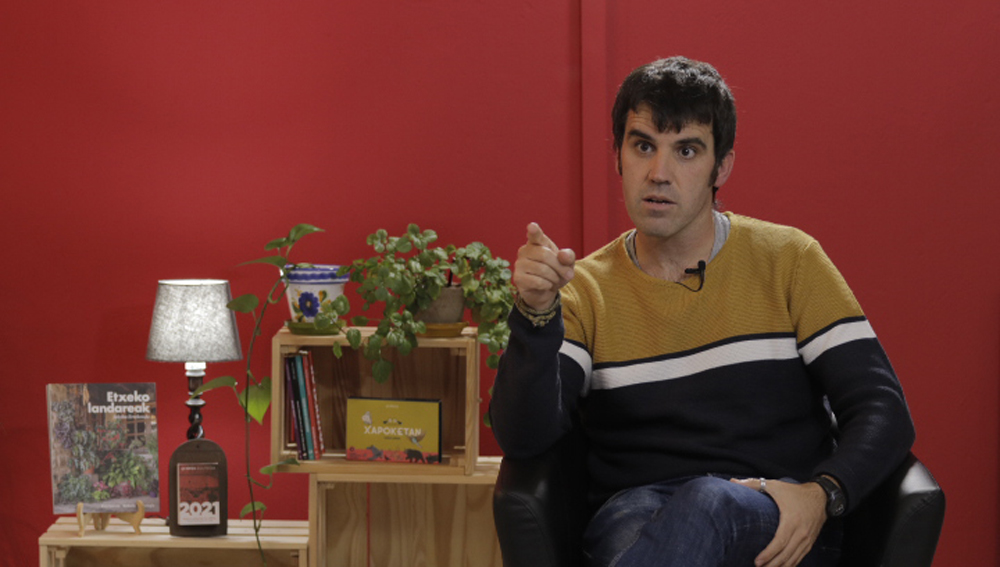
- The close relationship between COVID19 and the environment, the decline of biodiversity and knowledge of the environment in the Basque Country. “For the future, why should we boost that knowledge?” These are the keys that Iñaki Sanz collected in his speech, the author of the XAPOKETAN card game, to better understand the native animals. In addition to the video, you can also listen to it in podcast format in this link.

Sanz Azkue recalled that during the confinement a reflection was generalized: nature approached the cities. “But at the end of the lockdown, other issues were prioritized, especially those related to the economy and health.” Precisely, the rapporteur has emphasised that the environment is closely linked to the economy and health, since the reduction of biodiversity, the decline of biodiversity, will contribute to creating new pandemics in the future. “If biodiversity is not taken into account, it will affect our health and our economy. That’s what research says.” Although biodiversity is a fundamental issue, Sanz says there is a lot of talk about climate and climate change, but that is not the case with biodiversity. “Consequently, much less is known.”
Biodiversity consists of the variations and variations of the species, ecosystems and genes present on our planet, as well as the relationships that are established between them. In short, fauna, flora and its residential areas. Biodiversity is essential for human well-being, because it provides ecosystem services such as water, neutralization of toxic waste, oxygen… but in the increasingly urbanized society, we do not see where food comes from, buy it and do not relate it to its origin.
“If biodiversity is not taken into account, it will affect our health and our economy. Although it is a fundamental issue, there is a lot of talk about climate, but very little about biodiversity”
If we go back in time, we realize that the knowledge of the environment was much greater among the population. Iñaki Sanz has given several examples, including the Burbunak and Etsayak project:In the interviews with ten people between 60 and 90 years of age from Hernani, an average of 68 herbaceous plants of the area were assigned, without taking into account the trees and shrubs, as they had knowledge acquired from home. “How much would we be able to name today?” asks Sanz Azkue.
Studies say that knowledge of the environment has decreased a lot, mainly due to the change in lifestyle and urbanization, which has caused contact with nature to decrease – we associate it mainly with leisure – and that spaces of intergenerational transmission have been interrupted. “And what we don’t know we won’t see it and we’ll think it doesn’t exist.”
In the Basque Country, the students of the capitals know more animals of the savanna or of the rainforest than the native ones, which in the case of ecosystems know better the tropical forest than the native forest. This is the conclusion of the research we released in Argia. To go deeper, read Do children know the most common animals?
If the knowledge of native animals is small, in the case of plants there is direct blindness, according to the studies. To go deeper, read the study we published in Argia: We have them in front of us but we don't see them.
Consequences of ignorance. We're on time to turn it around
Iñaki Sanz warns of the consequences of this ignorance: indigenous species do not exist, we do not value their ecosystems and species – the position of society in favour of an indigenous species that is about to disappear, because it does not know the native species – is going to be greater than that of society in favor of the white bear that we know about climate change. There is no need to take action in favour of indigenous species, as they are not known, economic investments will be made in favour of alien species.
However, knowledge can change tolerance and attitude towards species. Studies say that increasing knowledge arouses interest in organisms and that concepts such as biodiversity, environmental problems and sustainability are better understood, and therefore also affect environmental protection measures.
“Let’s foster knowledge, let’s foster environmental culture through play, bringing us closer to nature, through search and observation, experimenting…”
“Let us promote knowledge, let us promote environmental culture through play, bringing us closer to nature, through search and observation, experimenting…”, recommends Iñaki Sanz. To this end, research, dissemination and training on this issue and, of course, the resources to work on the environment, including the XAPOKETAN card game that Argia has brought out, are important.
